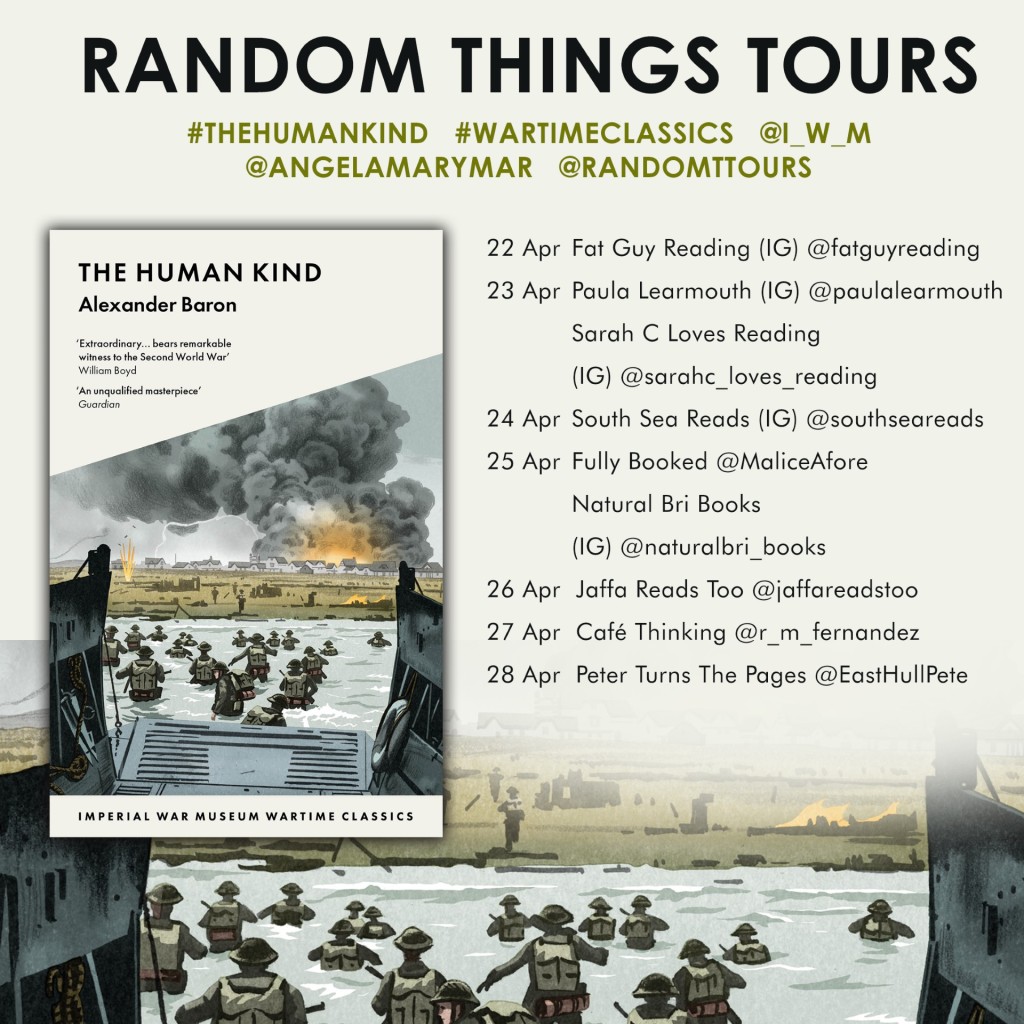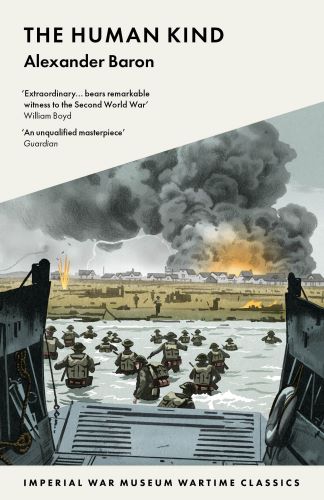By Alexander Baron
Published by IWM Wartime Classic https://www.iwm.org.uk/ @I_W_M
176 pages ISBN 9781912423798
Publication date 18 April 2024
The Human Kind is the third book in the author’s wartime trilogy.
I was sent a paperback copy to enable me to take part in this Blog Tour. I would like to than Anne at Random Things Tours @RandomTTours for the invitation to participate and of course the Publisher.
The cover
A very stirring cover, with artwork by Bill Bragg, showing soldiers departing a landing craft and heading for a beach. There have been some amazing recreations of these scenes in recent movies and this certainly captures some of the fear and trepidation the soldiers must have experienced when they were most vulnerable.
The blurb
Spanning the Sicilian countryside to the brothels of Ostend, and the final book in Alexander Baron’s War Trilogy, The Human Kind is a series of pithy vignettes reflective of the author’s own wartime experiences. From the interminable days of training in Britain to brutal combat across Northwest Europe, the book depicts many of the men, women – and, in some cases, children – affected by the widespread reach of the Second World War. In his trademark spare prose, Baron’s work provides an emotive and incisive snapshot into the lives of myriad characters during this tumultuous period in history. Based on Alexander Baron’s own wartime experiences, this new edition of a 1953 classic includes an introduction from IWM which puts the work in historical context, and concludes the author’s War Trilogy.
My review
I suppose the first question would be why reprint a book written in 1953? Well, it is regarded as a classic and after reading it is easy to see why. There are a great number of historians, professional and gifted amateurs who are producing well written and researched books on the Second World War. Many go back to primary sources and some even have interviewed those who lived through it, but what they lack is first hand experience and which makes a book of this nature compelling. It may have been written 70 years ago, but the prose style compares well with modern writing, is accessible and even quite fresh. So much so that it could easily have been written in the last 20 years.
The novel is set out as a series of anecdotes and observations, created from the author’s time in service, so well crafted I was unable to split fact from fiction. Spanning the full period of the war, from the author’s call up, service in the Sicily and Normandy landings, to the end of hostilities. They run chronologically, though the emphasis if more towards the latter period and vary in length. The reader is given a sense of the waste and futility of war, without it becoming fervently anti-war, more it was something that had to be done at that time.
It begins with the period of the ‘phoney war’ period when the authors regiment could experience almost an idyllic summer in the English countryside; by the end there are men chastened or broken by their experiences. In between through his acutely observed stories we see how these young men are changed through a succession of events. These are young men of varying backgrounds who were forced together and somehow must get along. There is a broadening of cultural horizons for some, through David Copperfield and the music of Beethoven. There is the development of mutual respect for those whose working life is different, most evident in the mining story where they had to work alongside tough, flinty miners. Reflecting on the stories it is easy to see how being exposed to these experiences formed a determined, well balanced and fair-minded generation instrumental to the postwar creation of the NHS, welfare state and determination to clear slums. First-hand experience sharpens the mind and many of us are now insulated from much of what this generation witnessed.
The experience may have had a positive character forming effect on some soldiers, but it also damaged many mentally. There is a disturbing tale of a man breaking down in the heat of action but most of all it is the sense of men being used up. Men fighting themselves to a standstill, using up all their reserves of mental strength to the extension of becoming little more than a physical shell. This is sympathetically described, will some insight and certainly the treatment of sufferers appears to be much better than those suffering from shellshock in the previous war.
There is no appetite to gloss over the bad and shameful though. We like to believe that our armies were more humane than the German and Russian soldiers, and whilst we never fell to the level of depravity that some of their troops did, they were no angels. One attack on a pillbox shocked and surprised me, bad things happen in the heat of war, but this was too much. There are stories that touch on the abuse, both physical and sexual, of women and children as well as a callous disregard for animals, property and life. We see those who are desperate to cling onto their sense of humanity even when others descend into brutality. Thinking objectively, I wonder whether there is a correlation between the length of true active service at the front lines and the dehumanising effects of war. Many of the Allied forces came into the theatre of war late, compared to say the Russians, and never experienced the atrocities of the Eastern Front, so perhaps this is why they didn’t succumb the madness of war to the same extent.
The Human Kind is an incredible testament to one man’s experiences as he clings onto his humanity during a savage war and is rightly being brought a new audience.
The Human Kind can be purchased direct from the publisher here
The author

Alexander Baron (1917 – 1999) was a British author and screenwriter. Widely acclaimed in his lifetime, he rose to prominence with his first novel, From the City, From the Plough, published in 1948 and based on his experiences of D-Day and the advance into Normandy. It quickly became a bestseller, achieving both popular success and critical acclaim, and reportedly went on to sell in excess of one million copies. The novel cemented Baron’s reputation as a skilled, powerful, authentic writer, and he went on to write many more books, including the second and third in the sequence, both best-sellers, alongside scripts for Hollywood and screenplays for the BBC.
Don’t forget to check out the other reviews on this blog tour:


Thanks for the blog tour support x
LikeLike